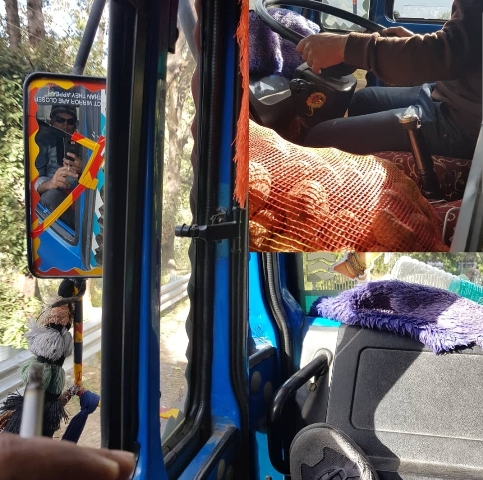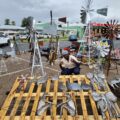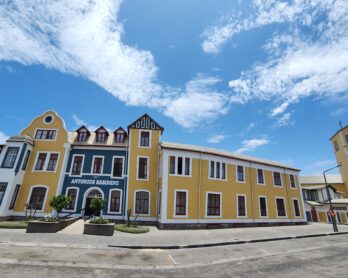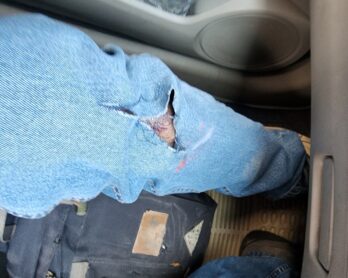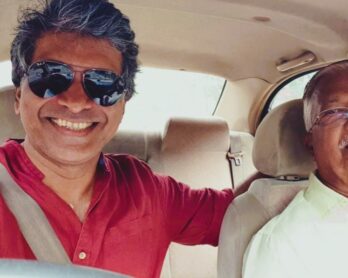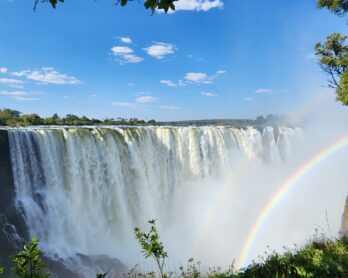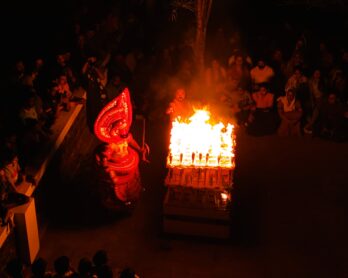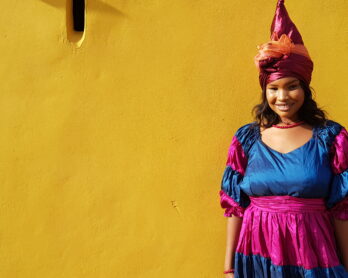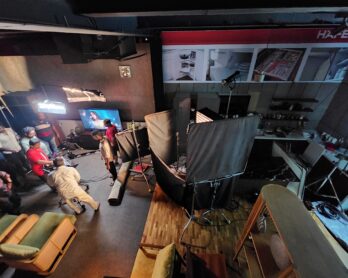The lorry juddered to a halt. We were passing through one of those Himalayan hamlets that always looked like they were shut for the night. Like many others along the way this one too had sprung up around a sharp curve on the winding road. Habitation, commerce even, around these bends made sense as vehicles slowed down considerably and those like I was travelling in – 20 feet long and laden to excess capacity – took forever to pass. A lot transpired too by the time the road straightened – water bottles filled, news exchanged and locations updated of roving tax or police squads.
By now I was used to our parking habits – or lack of them. There was nothing like pulling over – we just took the road with us wherever we went. And each time we stopped. Then there was no helping it. I looked at Singh in askance – he had been stopping at many of these places to shoot breeze, buy beedis or sachets of chewing tobacco with their little tubes of lime and once even a bottle of rum.
“There is a pig under the lorry,” he said.
“Damn! Did we run over it?” If we did then we were in a spot and would be required to dish out some serious dosh before we were allowed to proceed. I wondered about the contribution expected from me to the dead pig collection.
“No, no it’s not dead,” he replied. “It just ran into between the tyres.”
Singh then pulled the handbrake lever hoping the loud hiss of the compressed air would scare the pig away. I, who had always taken undue pride in my driving skills, who was itchy and prayerful in a vehicle not manned by me, marvelled at the sheer skill and circumspection on display. Earlier too at the start of our journey Singh had braked hard at a blind curve a moment before a couple of girls in school uniforms landed right on our path jumping gaily from a mesh-covered embankment shrouded by a canopy. The admonitions that followed cut a thin line with veiled leer.
Cabin life
When I scrambled into Singh’s Leyland lorry at Haldwani in Uttarakhand bound for Dharchula near the Nepal border 300 km away a sackful of potatoes already occupied the passenger seat.
“This is for my randi (crude Hindi for hooker) who runs a dhaba ahead of Almora,” he said matter-of-factly as he tried to squeeze it between the extended seat and the console. Since it didn’t fit he shoved it closer to his own seat and the gearbox. Assorted wires, plugs and knobs jutted out from the darkness where my legs were supposed to rest; I kept my aerial camera box and backpack on the seat itself and sat on it cross-legged.
“If you are interested I can do the ‘setting’ for you too,” he said revving the engine and holding my gaze. ‘Setting’ was street speak for fixing up someone with another, usually used in the context of a randi. Much as promising as it sounded on a wintry morning there were more urgent matters to consider. Like settling down for two days of travel which included 20 hours of torturously slow driving along cold, winding roads. I promised him that I would seriously mull the offer in time.
The cabin was a cosy abode of sorts, familiar and tacky in equal measure. Orange epaulettes hung from the ceiling waving in the wind like an upturned field. Favourite gods were arrayed on the roof, looking down as they might be in real life. Singh was a religious man and we stopped by a few temples along the way. At one right before the steeper climb began we offered money to a priest who passed a steel vessel with different coloured tilaks for us to smear on our foreheads. We were presented a coconut as acknowledgment of our devotion too. Songs from the 80s played from a pen drive creating different internal moods alternating between tapping white shoes and teary-eyed lovers challenging what the Japanese calls ‘Shouganai’ or what you cannot help. To my initial consternation, the passenger seatbelt was pulled out completely from the retractor and tied at the opposite end of the cabin as a makeshift clothesline. Tee shirts and trousers held down smaller laundry like underwear in place. Pillows and blankets were piled up behind the driver seat, the deeper recesses of which also held different alcohol bottles. Other chattel was scattered about on the floor of the cabin. Cold draft flowed unhindered through my window the pane of which was missing.
“It was broken by some behen choots (sister fuckers) who drank my daru (alcohol) and then tried to burgle my cabin when I was sleeping,” he said with a grin. “I was so talli (super drunk) that they didn’t expect me to wake up.” From beneath the seat he pulled out a knife with an ornate handle, a Rampur chaku or dagger. He handed it to me for a closer look. I have a modest collection of knives myself including an elaborate kris from Indonesia but have never been one for gravity knives like the one I held. It was cumbersome for any actual use, I believed. But the handle was an exquisite piece of work, scrimshaw on brass, with the image of a lion stamped on to it. My eyes glinted like the blade against the sun and Singh asked me whether I wanted it. There are more behen choots out there, I reminded him.
We both laughed.
Potatoes for the paramour
Pine trees peeped up the roadside as green hills fell away into a blue haze beyond which we spotted the snow-capped beginnings of the Himalayas. Since the locals threw tourists out of Shimla last year as water ran out, Nainital had taken on the mantle of a popular honeymoon destination. The traffic was sporadic but still high for the winter season; most of the lay bys had become view points and tourists were either pinching mountain tops or holding them aloft like Hanuman. At the dhaba where we stopped for breakfast the young cook fussed over us, was in awe of Singh. He said he was saving up so he could be a lorry driver someday. But Singh himself dismissed him as a sort of dof.
“The other guy’s wife and work are always more attractive,” Singh scoffed.
We ate little platefuls of tater covered with chopped red chillies, mustard seeds and garam masala. I had bread pakora too which Singh avoided saying it gave him a bloated stomach instead he had a second plate of the potato dish. After washing it all down with kulhad tea or tea from clay cups, we resumed our journey.
At each road shoulder he would glance in the rear mirror, slow down and make way for trailing traffic. Some acknowledged the courtesy with a curt honk which Singh always returned. A few who had lagged behind for longer durations shot past like Angry Birds on wheels, kicking up a lot of dust and swerving on to the road manically. It was funny because if Singh noticed it he didn’t give a rat’s ass to this puerile churlishness. He would always use the opportunity of freeing his hands briefly to light up. While on the road myself I have honked courteously as well as shot past gruffly. But now I understood one thing: these truckers didn’t notice you unless they could do something about it. They come across as belligerent bams as there is nothing much they can do about it, most of the time. ‘Wait for side’ was a promise like any other.
The morning wore on as we wound our way up the Kumaoni hills, grunting towards the Himalayas, one song after another, one hairpin curve following another, around windward to leeward and back. Five or six times during the entire trip he buckled up, fumbling clearly due to lack of practice (‘It is dangerous wearing a belt in the mountains unlike in the plains’) and turned down the volume almost to a mute. And each time in under five minutes would appear a check post with armed guards who would look at us with disinterest and unsuccessfully ignore Singh’s effusive greetings. No sooner after we have passed he would launch on a tirade against the ‘behen choots whose one purpose in life is to bust your ass’.
Corners were always a hotchpotch of honking, the music blaring from inside the cabin made it difficult to discern the distance of incoming traffic too. Singh himself had three different kinds of horns. Overloaded taxis sped past us with women or children’s heads hanging out like prized trophies of head hunters. It was too early for soroche but bombinate my head had begun to. We pulled over at a shoulder and Singh excused himself saying he was going to get ‘fresh’ and disappeared to the other side of a knoll with a jerrycan of water, beedi smoke trailing behind. Upon return he dug out a bottle of rum from behind his seat and made a stiff one for himself with the water from the same jerrycan. It was just the idea that was repulsive but the water was just fine, Evian-like – collected from one of the piped outlets that led from the heart of mountains.
From collecting drinking water to washing the truck, acting as reverse cameras to keeping an eye on the side were all the jobs of a ‘chotu’ literally a ‘little one’ or helper. Singh had gotten rid of his own chotu to save a per diem rate of Rs 800. Besides, the bloke was a bit ‘too talkative for his own good.’ Though the shenanigans of lorry drivers were the stuff of sleazy lore, it didn’t help especially when these chotus were from their own localities. Doing one job of the chotu was a small mirror placed directly above the window of the passenger seat angled towards the driver. From the way he went on dissing his erstwhile chotu I couldn’t help but wonder whether Singh actually missed him. Then, that’s what journeying together did – it made you grow close if not necessarily fonder of each other.
In the distance the tinny tops of houses of Almora glinted in the afternoon sun. We were bypassing it along a rather busy road but with stunning views. Singh, who was by now two drinks down, kept pointing out the hills which sprang right before our eyes. Each time his pointing lingered as did his gaze in my direction. Twice or thrice I pointed out to him approaching gorges, gulping down my heart with a forced grin. His randi was still some distance away and I asked him whether we could have some grub as it was well past lunch hour. We stopped at a small restaurant where we had rice with vegetable curry and fried goat boti or intestine. Back in the truck he finished his bottle and started sharing salacious tales of possibilities across the border at Dharchula.
The first time I came across a highway randi was when I motorcycled from Hyderabad to Delhi some years ago. I had stopped at a highway dhaba on the outskirts of Nagpur when a truck pummelled in kicking up dust and a scrawny woman in a jaded ghagra choli squatted on the edge of the cabin before hopping down. A thin brown arm held a heavily brocaded choli which covered her head. After a while she left in another truck the same way she had come; not much, not much that I noticed, happened in between. Noticing my curious stares the proprietor who was serving winked at me, stuck his middle finger next to the index in an arc and said ‘randi’ – the first time I heard the word.
A battered Maruti Alto was parked outside the hovel covered by a tarpaulin sheet. Singh stopped the lorry behind the car and pressed down the lever of the handbrake. Two guys scurried out and smiled sheepishly at Singh who waited in the cabin till they left in their car. Gesturing at me to wait, he came around the front, took his sack of potatoes and walked towards the shanty. Switching on the front camera of my mobile, I held it outside my open door and played peeping Tom to the goings on. A woman in a sari and a sweater sporting a headgear sat on her haunches by a chula or wood fire cooking place. Singh lit a beedi with a log, every inch the reckless cowboy, before disappearing inside with the woman. He told me later he took her standing, from the back. Probably explaining why it over in a jiffy. They came out a few minutes later when she got back to squatting next to the chula.
Singh now gesticulated towards the cabin and I saw the woman look up from her fire. He grimaced as he clamped a fresh beedi between his teeth as he started to walk towards me.
I switched off the camera.


